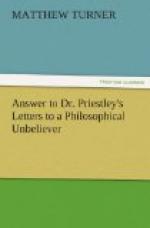Dr. Priestley will have it, that all bodies are moved by external force. That does not seem quite necessary. Motion may as well be asserted to be originally a property of matter, or its true natural state and rest a deprivation of that property, as that rest should be its natural state. Hume thought so and Hume was no great fool, notwithstanding Dr. Priestley makes so light of him. In fact matter never is, and therefore most probably never was found to be in a state of rest. Nor has Dr. Priestley any reason to suppose gravity, elasticity and electricity to have been imprest on bodies by a superior Being, and not originally inherent in matter, unless to favour his own hypothesis of a Deity. He absolutely says matter could not have had those powers without a communication from a superior and intelligent Being. If matter is perceived in regulated motion, it is added bluntly, that it must be by a mover possessed of a competent intelligence, and that a Being therefore of such power and intelligence must exist. Whoever finds no difficulty in believing the contrary will find as little difficulty in Mr. Hume’s hypothesis, that motion might as well as other powers and properties have been originally inherent in matter, or at least have been a necessary result of some matter acting upon another.
It has always been a doubt with Theists, whether they can better prove their God’s existence by moral or physical considerations. Dr. Priestley seems to think the forte of the argument lies in the latter proof, and lays particular stress upon his observation respecting cause and effect, which therefore cannot here be so readily dismissed. He makes great reference to the works of art. Theists are always for turning their God into an overgrown man. Anthropomorphites has long been a term applied to them. They give him hands and eyes nor can they conceive him otherwise than as a corporeal Being. In which, as before has been said, they are very right, for there can only be in the world body and the space which bodies occupy. But granting this great workman to have done so much, is it not quite an incontrovertible proposition, that whoever first made a thing, as, for example, a chair or a table, must have had an adequate idea of it’s nature and use. Dr. Priestley speaks more correctly in another part, by saying, he must have been capable of comprehending it. The nature and use of things are often found out after they are made and by different persons than the makers of them. Neither is there any analogy between the works of art, as a table or house, and of nature, as a man or tree. Therefore there can be no arguing from one to another by analogy. Hume observes that the former works are done by reason and design, and the latter by generation and vegetation, and therefore arguing from effect to causes, it is probable, that the universe is generated or vegetated. At least after all the observations about a table, it may be modestly asked, whether there is not some difference between a table and the world? The Doctor will also find some difficulty in explaining the propriety of any argument of analogy between men and metals, which he does not at other times scruple to make?




